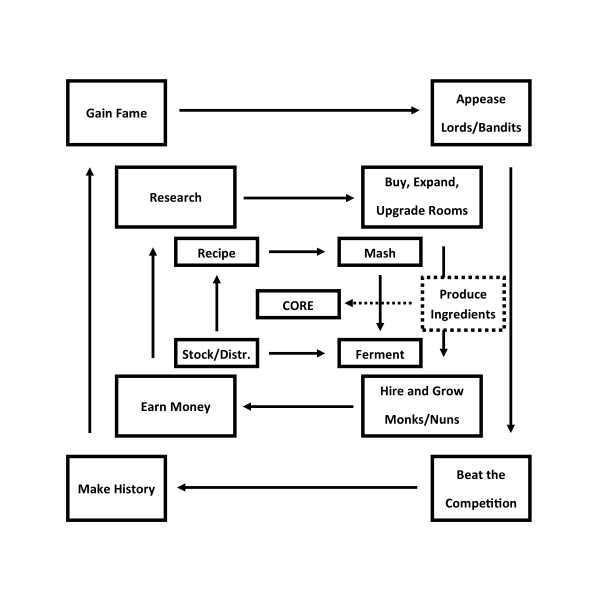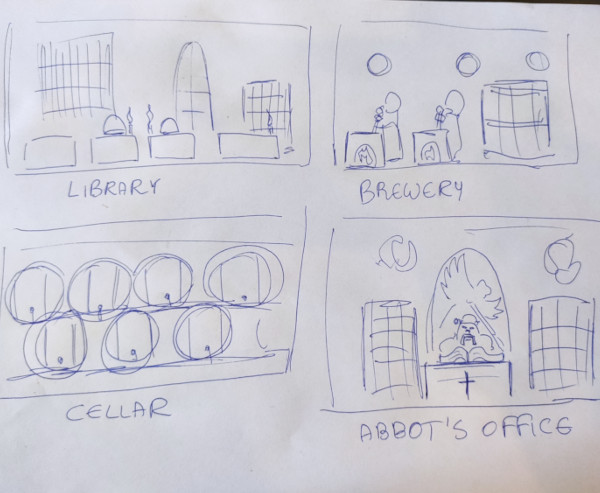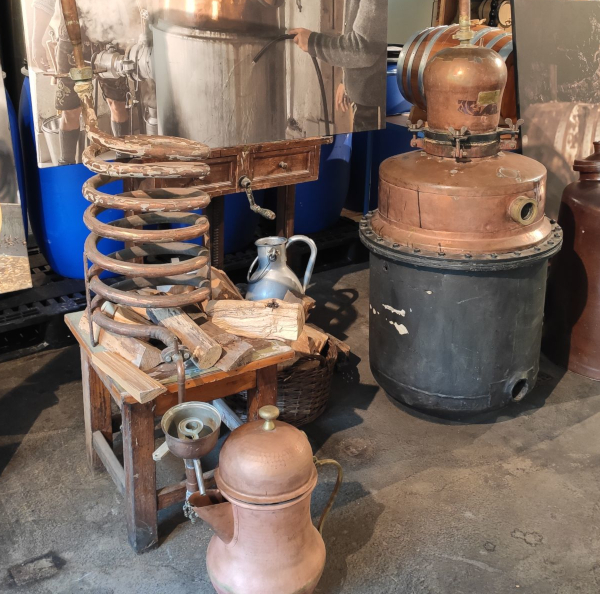This week in Something's Brewing we're talking about time and how you can choose to spend it in-game and while making your favorite brew. We answer questions that have to do with how Ale Abbey's storyline is generated, how this can change in between playthroughs, and give out a few more details about how the story around your Abbey will be shaped!
Today's article banner comes from Emiliano's recent "research" excursion to Stiegl-Brauwelt, Austria's huge museum, and brewery. It is a depiction of an original glass window design for the brewery in Salzburg (circa 1492).
We're curious as to what you might want to ask about Ale Abbey, and are always up for some quick homebrewing tips! So, if you have any questions, let us know in the comments!
-- What is the expected playtime of a playthrough in Ale Abbey? Would there be a way to complete a run faster or slower?
Being a tycoon game, Ale Abbey is designed to allow choosing one's own pace playing it. The campaign playtime will approximately be around 30 to 50 hours, but there's still a lot to test and define before we can answer this more precisely. However, free-roaming playtime (think of it as open-ended gameplay after one finishes the campaign) will be an option and will be potentially endless, so it's hard to encapsulate that part within a time frame.

-- What will be the format of the overarching story?
Even though we're still designing this part, the overarching story will be based on creating 150 or 200 years of the Abbey's chronicles (from 1400 to approximately 1600; set around the European Renaissance). The story will revolve around the 4 Abbots/Abbesses that will be guiding the Abbey during this time frame. Every 50 years the player will be asked to choose a successor from a pool of two (an Abbot and an Abbess) and every successor will bring their own set of attributes and some personal backstory. Their own backstory will develop over the course of their term guiding the Abbey and will be shaped by events (player reaction to historical events) and confessions (player deciding on backstory-related events). This way a player's decisions also determine the overall "heritage" of the Abbey, but we can't share more about this as it's being drafted right now!

-- Will there be mini-games or side quests in Ale Abbey to flavor it up? What will replayability depend on?
Replayability will mostly depend on the game being a tycoon game. With each playthrough, the player can choose completely different ways to develop the monastery based on their priorities. This could mean choosing to brew different ales, focusing on different research paths, expanding the monastery in different ways, etc.
Now, Challenges (Pilgrims' and Lords' Challenges) would be the closest to what we would call side-quests. Through these Challenges, the player can choose to focus on some randomly generated specific task in order to achieve a special reward. Or... they can decide not to. As for the mini-games, we like the idea, but for now it's a bit too early to confirm or deny what could eventually fit in our production time frame.
-- Homebrewing as a process seems to have too many steps. Where can I cut corners?
To be brutally honest, there are ways to at least follow a more simplified process, depending on the brew at hand.
Allow us to explain with a couple of examples:
i) Traditional German beers are mashed with a method called concoction, where you take part of the wort, heat it on a side, and let it caramelize a bit, then put it back into the main mash to raise the temperature, and you repeat a few times. That process is said to give the full German character to beers, but Emiliano has had beers made with a single-step mash (set a temp, wait, done) that were nearly indistinguishable from their concoction-made counterparts.
ii) Wort chilling. It is said that not cooling the wort fast enough after the boil can allow for the development of a plethora of bad aftertastes. While Emiliano had amazing results with chilling, there were a few times it took him longer than it should. Also, Yannis almost never cooled the wort fast enough due to a lack of proper equipment (still fast enough to not cause infections). Both had zero problems with aftertastes.
In reality, we can say it depends on the level of dedication and the amount of time you want to spend on the process. It's possible to go for more or less simplified and shorter solutions, and the results can still be very good. Having said that, there's one thing you can't really cut corners on... sanitization. Messing with that is when you find yourself pouring ales down the toilet.

Thanks for your time and see you all next Friday!
-- Hammer & Ravens
Do you want to know more about Ale Abbey? Don't forget to follow us on:


